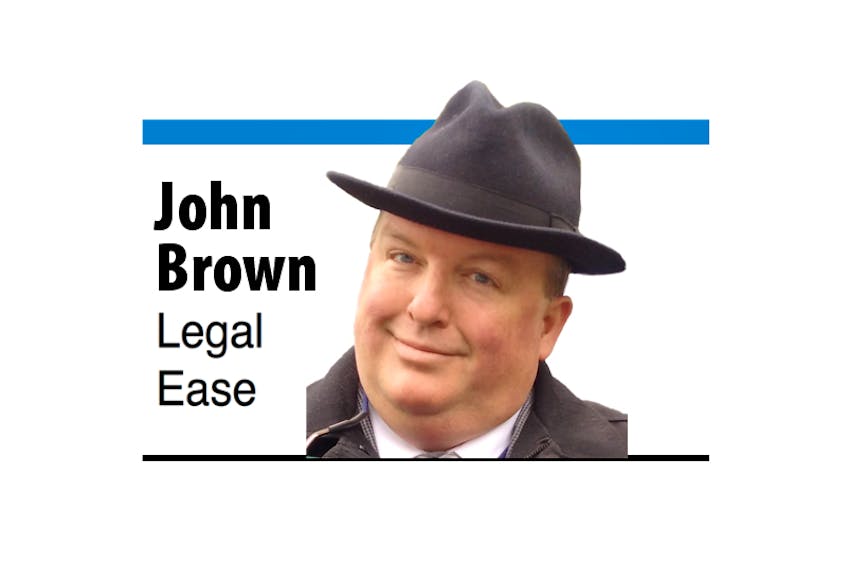I still practise criminal law, from time to time. Compared to civil litigation, criminal litigation is attractive because you can get your matter into a courtroom faster.
Sometimes I despair in civil litigation, and worry that if I had to hop through one more rule of court or new requirement hoop I may use words you shouldn’t hear in a public place. Another thing I like about criminal law is you can practise here in our own backyard, because provincial court, like the one we have in Harbour Grace, takes up the lion’s share of this sort of work.
With amendments made to the Criminal Code of Canada over the last quarter century, the onus is often upon the Crown Attorneys to make sure we humble defence lawyers get the entirety of the police case, and that we get it in writing. In what other area of law can you get the lawyer on the other side to do some of your work for you? But I digress.
Another feature under the code, but one that has always been there, is the presumption of innocence. This is also a right all individuals in Canada possess, pursuant to the Canadian Charter of Rights and Freedoms. The Crown Attorney has the burden of trying to prove guilt against an accused client and further, they must prove that guilt to the satisfaction of a judge or jury beyond a reasonable doubt. One notable former Crown Attorney who just took up the judgeship in Canada’s far North told me years ago that he thought we criminal defence types had it made. Perhaps he was right.
But there is an aspect of criminal law you don’t see very often in its civil cousin, and that is the prospect of an accused person trying to give up any responsibility over how their trial will be conducted, in effect leaving the whole thing up to their defence lawyer. It doesn’t happen a lot, but when it does it can be stressful and embarrassing and it can make lawyers like me question the wisdom of working in the criminal environment.
Let me give you an example of what it is I’m talking about. I had a client whose matter was set to go to trial. We had met on previous occasions where I took the client's information down, and we met further on later occasions when I received the police reports from the Crown Attorney, for us to review this information together. And we met at different times gathering evidence that could be used for the client's defence. But as the trial date loomed, my accused client began to get cold feet over the entire affair. They missed meetings and when I called them at their home, they tried to assign blame onto yours truly.
When the matter was finally completed by a guilty plea, wherein I followed their explicit instruction and questioned them about it pursuant to section 606 of the Criminal Code of Canada, they later balked and said they were just doing what I told them to do.
Apparently lawyers have this power. Apparently we can tell innocent people simply to plead out – in other words plead guilty to a plea bargain – and they will do so, regardless of whether or not they are innocent. Of course, I am being ironic, and I encourage any person who finds himself in trouble with the criminal law or otherwise to take as much responsibility for themselves and for what they’re doing as they can. Because while my professional activities can include attending at your home if you can’t come to see me or, as in this case, include a number of phone calls made outside of office hours and over the weekends to accommodate the schedule of busy stressed-out clients, it does not include, nor will it ever include a feature wherein I become your boss and you must do what I say with respect to your criminal file. It just doesn’t work that way.
Sometimes I think people view a shortened appearance in court as some sort of break or easement for the lawyers involved. However, this is categorically untrue. If you’re prepared to go to trial on a trial day, then your work has been prepared, your file has been upgraded and you have your time set aside. All a missed court date does for me is, I go back to the office looking for something else to do, because in the small legal practice there is always something else to do.
Clients can, and should be able to find competent counsel they trust to help them in their matters and it is the duty of any counsel who agrees to take on the case to do their utmost to act towards the best legal interests of their clients and to look for the best possible outcome.
But taking the blame for your client’s decision on expediting a trial? I couldn’t find that anywhere in my handbook.
John Brown is a lawyer based in Bay Roberts. He can be reached by email at [email protected].








